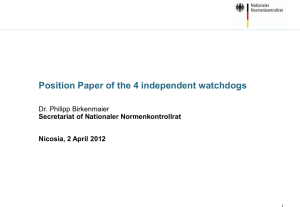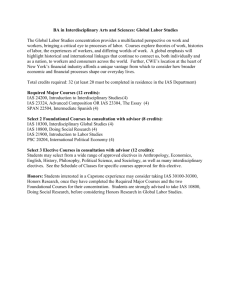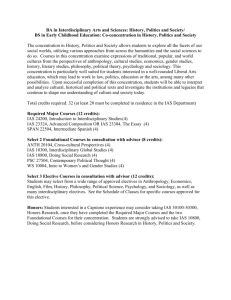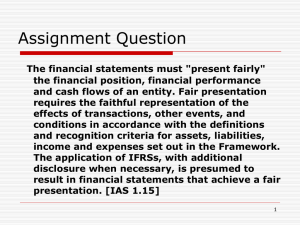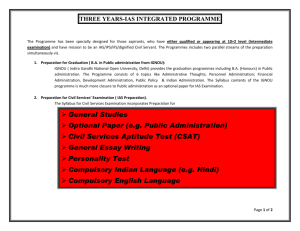of September 2015 EU Regulation on Invasive Alien Species
advertisement
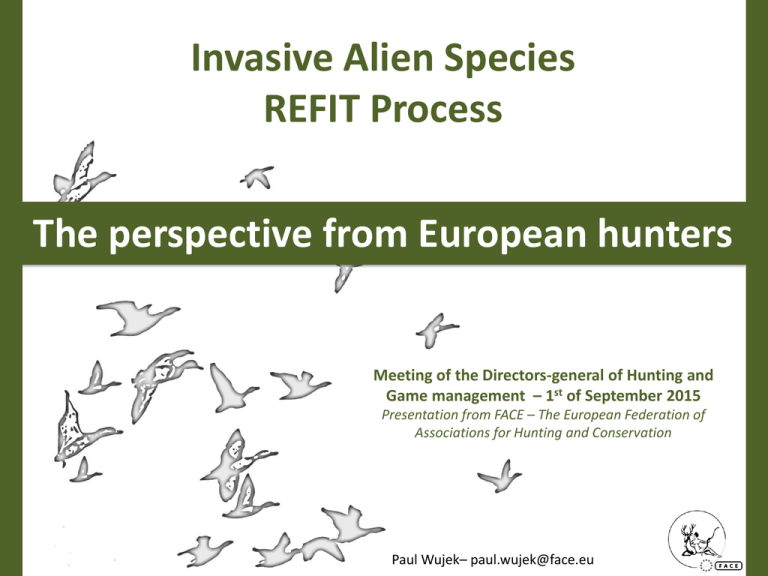
Invasive Alien Species REFIT Process The perspective from European hunters Meeting of the Directors-general of Hunting and Game management – 1st of September 2015 Presentation from FACE – The European Federation of Associations for Hunting and Conservation Paul Wujek– paul.wujek@face.eu EU Regulation on Invasive Alien Species Adopted in November 2014 - Entering into force as of 1st of January 2015 Structure: Chap. 1 General Provisions: Scope, List of EU concerns, risk assessment, etc. Chap. 2 Prevention: Restrictions, permits, Authorisations, Emergency measures, Actions plans on the pathways, etc. Chap. 3 Early detection and rapid eradication: Surveillance system, official controls, derogations, etc. Chap. 4 Management of widespread IAS: management measures, restoration of damaged ecosystems Chap. 5 Horizontal provisions: cost recovery, cooperation and coordination, more stringent national rules, etc. Chap. 6 Final provisions: reporting and review, information support system, public participation, committee, scientific forum, exercise of the delegation, penalties, etc. Meeting of the Directors-general of Hunting and Game management – 1st of September 2015 EU Regulation on Invasive Alien Species Chapter 1 – General Provisions List if Invasive alien species of Union concern • • • • • • First draft to be available in November 2015 To be officialised in January/February 2016 Should meet all 5 criteria described in the regulation (art. 4) Should be developed based on a risk assessment (art. 5) May differ from the national lists (art. 12) Reviewed at least every 6 years Chapter 2 – Prevention Restrictions: 8 criteria + prevention of unintentional introduction (art. 7) Permits: rules for derogations on the restrictions set in article 7 (art.8) Authorisations: for activities other than those set out in Article 8 based on public interest or socio-economic reasons (art. 9) APs on pathways for IAS: to be developed for preventing unintentional introduction and spread of IAS (art. 13) Meeting of the Directors-general of Hunting and Game management – 1st of September 2015 EU Regulation on Invasive Alien Species Chapter 3 – Early detection and rapid eradication Surveillance system (art. 14) • Collects and records data on the occurrence in the environment of IAS • Done through surveys, monitoring activities or other procedures Rapid eradication at an early stage of invasion (art. 17) • • Conducted within three months after the detection Should be effective, with regard to human health, the environment and animal welfare Derogations from the obligation of rapid eradication (art. 18) • If technically unfeasible, the costs are too high or methods are not available Chapter 4 – Management of IAS that are widely spread Management measures (art. 19) • Developed within 18 month of an IAS being included • • Shall consist of lethal, non-lethal physical, chemical or biological actions Should be proportionate to the environmental impact Restoration activities (art. 20) • To assist recovery of an ecosystem degraded by IAS Meeting of the Directors-general of Hunting and Game management – 1st of September 2015 EU Regulation on Invasive Alien Species Timetable for implementation Date of application After adoption of the List of IAS Action Article List of IAS of Union concern Article 4 18 months MS carry out comprehensive analysis of unintentional introduction and spread Article 13 3 years Ms implement action plan or action plans to address priority pathways Article 13 6, 12 and 18 years MS review their action plans and transmit them to EC Article 13 18 months MS to establish the surveillance system Article 14 MS to establish border patrols Article 15 MS put in place management measures Article 17 By 1st of June 2019 and every 6 years MS to submit the report Article 24 By 1st June 2021 EC to assess the Regulation Article 24 By 2nd January 2016 EC Information support system is established Article 25 By 2nd January 2019 Information support system is used as mechanism for information exchange Article 25 By 2nd January 2016 By 2nd January 2016 18 months Meeting of the Directors-general of Hunting and Game management – 1st of September 2015 Bern Convention Group of experts on Invasive Alien Species (IAS) Established in 1992 Since 2009: focusing its work on the identification and prioritisation of pathways, and started preparing targeted Codes of Conduct to address these priorities Currently: • following the implementation of the Codes of conducts as well as the EU IAS regulation • Monitoring progress made at national level for combating IAS • Exchanging of experience In the future: • developing guidelines for assisting Member States in the implementation of the IAS regulation • supporting non-EU countries in developing related frameworks Meeting of the Directors-general of Hunting and Game management – 1st of September 2015 Code of conduct on Hunting and IAS Adopted in December 2013 Seven principles: 1) Avoid intentional and unintentional releases of new IAS (game) 2) Avoid intentional and unintentional introduction and spread of invasive alien plants for game food and shelter 3) Use alien species for restocking only if non-invasive or introduced in ancient historic times 4) Select source for restocking from populations with appropriate genetic and pathogen management 5) Practice animal-aided hunting minimising the risks of escapes and of impacting native species 6) Consider eradication and control as essential management tools to tackle IAS and support their implementation also when targeting game species 7) Collaborate in monitoring and surveillance programmes on IAS Report on the implementation of the Code of Conduct • Presenting activities of European hunters and falconers contributing to the Code of conduct – to be updated by the end of 2015/beginning 2016 Meeting of the Directors-general of Hunting and Game management – 1st of September 2015 REFIT Process Public consultation ended on 26 July 2015 Number of replies: 552,470 replies were received Responses were received from all Member States. The highest number of replies came from Germany and the UK (each around 100,000 replies) The vast majority of replies (99%) were submitted by individuals Stimulation through targeted campaigns. The Nature Alert campaign generated more than 520.000 participants. The large majority of respondents replied that their main field of activity or interest was “nature” (93%), followed by those active or interested in hunting (4%). Next steps: Autumn 2015: a dedicated conference will be held on the Fitness Check in Brussels, where draft results of the evaluation will be shared and discussed with Member States and key stakeholder groups. Early 2016: publication of Commission report on the results of the Fitness Check. Meeting of the Directors-general of Hunting and Game management – 1st of September 2015 Thank you for your attention Contact Person: Paul Wujek – paul.wujek@face.eu
